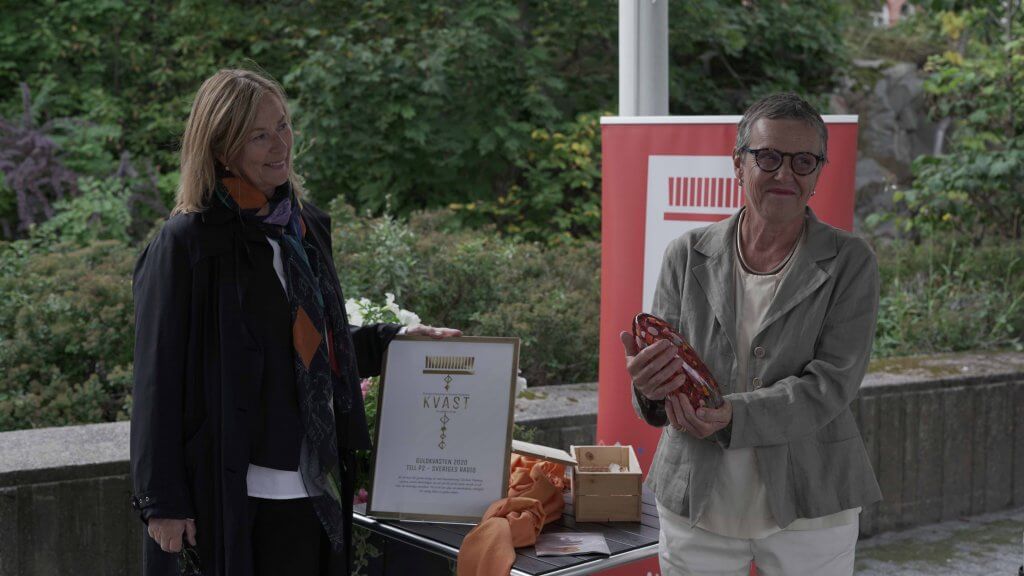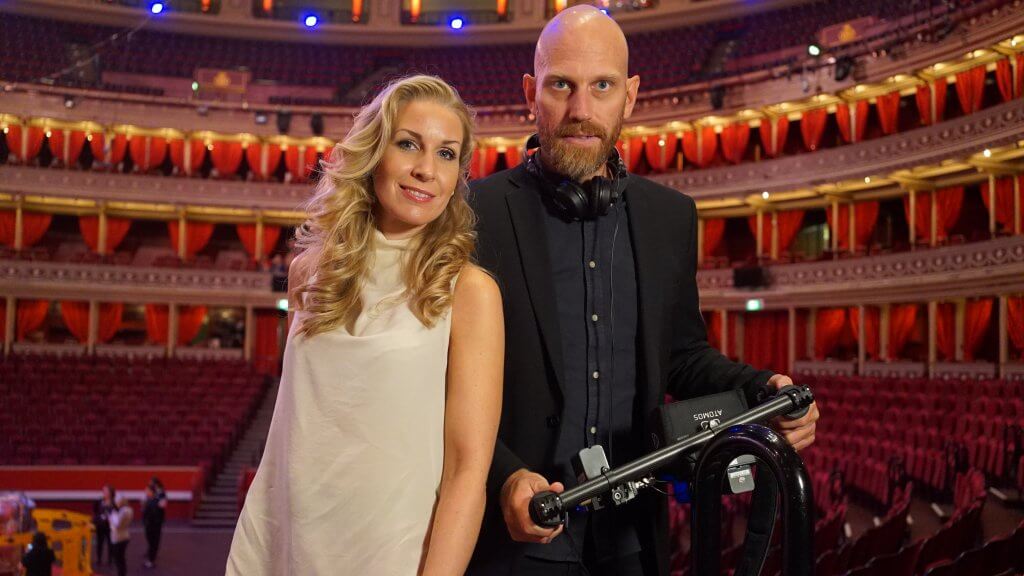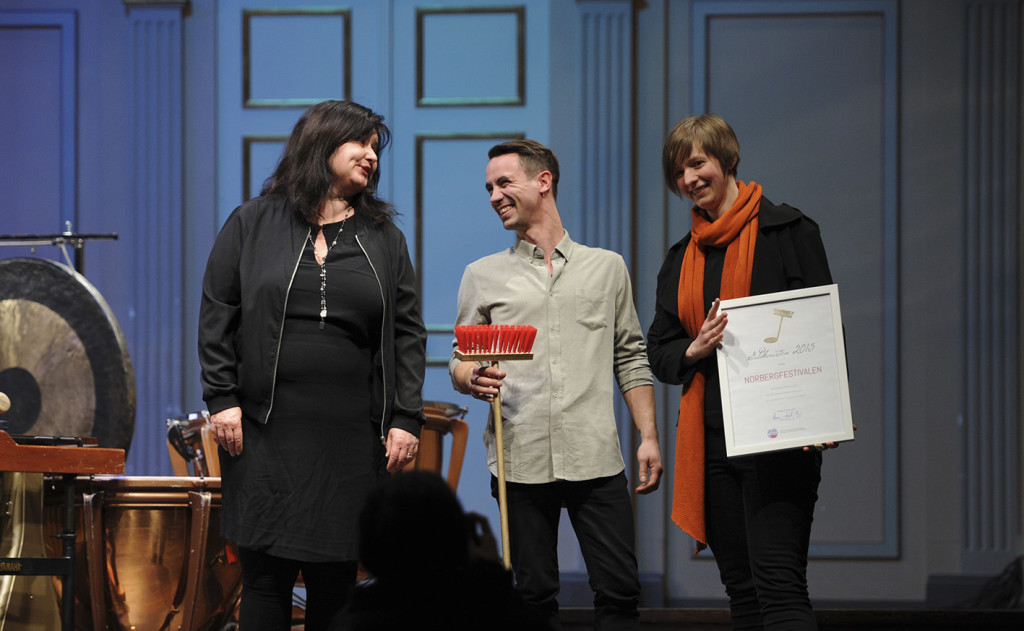The Gold Broom Award!
KVAST has instituted its own prize, the Gold Broom Award (Guldkvasten). The award is given to an orchestra or a commissioner of orchestral music, chamber music/electroacoustic music, or opera, in recognition of excellent work undertaken in support of women composers. The prize includes a specially composed fanfare that is played at the awards ceremony.
The Gold Broom Award 2020
KVAST—the Swedish Association of Women Composers—has chosen to award the Gold Broom to an institution and one person in particular whose names have long arisen in relation to this award. This year’s prize is about music at a distance as it both reaches and touches all of us.
THE GOLD BROOM 2020 goes to P2 - Swedish Radio, with the following justification:
Because through the years, with station manager Elle-Kari Höjeberg at the helm, consciously advancing the issue of and ensuring that music by women composers is being played and talked about. In this way, our musical world and awareness have become so much richer.

In addition to the award certificate, the award includes a unique crystal obelisk especially designed for P2 by Sofia Bergman and made by Micke Johansson in Skruf.
Elle-Kari Höjeberg, station manager for P2: “It is an incredible honor to receive a prize that acknowledges the work that has been done so that more women composers are being heard on P2. It is great proof that our work has made an impact and it gives us the energy to continue.”
(Also see the interview with Höjeberg below.)
KVAST’s chairperson Astrid Pernille Hartmann says:
We are moving, though slowly, toward a more equal musical world. With this prize, KVAST, whose primary concern is working toward equality in the music world, wants to congratulate P2 and Elle-Kari Höjeberg and her colleagues who, for the last decade, have been able to double the number of works by women composers they have played, integrating them and emphasizing them in their musical offerings. This inspires our fervent hope that in the 2020s, P2 will take up its efforts again, doubling the proportion again and reaching the 20-percent mark!
Honorable Mention 2020
This year, KVAST has also decided to award an Honorable Mention. This goes to the trio behind the TV series, She Composes Like a Man:
Cathrine Winnes, concept, script, and contributing host
Andreas Lindstad, director, editor, producer
Ella Petersson, executive producer, SVT
Justification: She Composes Like a Man takes a firm, ingenious, and tactful grip on the music itself as well as the female composers’ lives and creative process, and it is all communicated with contagious engagement by the series’ host, Cathrine Winnes.
Cathrine Winnes: “Thank you for the fantastic news and for the honor! This award makes me feel incredibly inspired to continue my work. Thank you so much!”

Interview with Elle-Kari Höjeberg
The Gold Broom Conversation: On a Journey toward a Richer Music World in the 2000s
Elle-Kari Höjeberg, station manager at P2, has been the driving force behind the emphasis on women composers for many years. Here, we find out a little more about her work on this issue.
KVAST: When and how did these efforts toward equality in music begin?
EKH: Around fifteen years ago, both we and others began to notice that P2 “Jazz Cat” wasn’t really reflecting the development with new women composers and performers who were coming on the jazz scene. But we also saw that the number of women vs. men in awards and stipends from the Royal Swedish Academy of Music, for example, were significantly dominated by men even though we at P2 had been highlighting women composers for several years. It felt strange. We were getting questions and felt we had to develop a detailed strategy for how women would be heard more on P2 at every level. Music doesn’t have a gender, after all. In this regard, I want to emphasize that such organizations as IMPRA and KVAST were driving forces at the time.
In 2010, we started taking data of “sample weeks” on P2 and how many works by women vs. men were being played on the station. It was a little depressing, barely 7%, but it was still better than the statistics from the Swedish concert halls. We set a goal of doubling this and began working together with our music editors, music producers, and program hosts. There were several challenges, for example that there weren’t many audio recordings of contemporary women composers. We have our own recordings, which we started digging through, and we have informed concert halls and institutions clearly that we are prioritizing the broadcast of concerts where women composers are part of the repertoire.
P2’s capable producers who plan large parts of our playlists also make a conscious effort to highlight women performers and make sure to document this, so we are truly making sure to broaden and deepen our approach over time. Anecdotally, the producers have a particular binder that has grown thicker and thicker over time. Music by women composers now permeates the playlist all day long at P2 in a completely natural way. At the same time, a whole lot of positive things have happened in the music world we’re part of.
Even though we’ve reached our goal with a near-doubling of the number of works, we are still not happy, of course. We want to broaden our playlists and play new music and new recordings. There is also a fresh interest in recording companies to notice women’s music from different periods, which facilitates all of it for us.
KVAST: But it’s not just about playing music, right?
EKH: In addition to playing music, we also want to give our listeners a sense of history and stories about women in the music world. We do this through P2 Documentary, The Music Archives, and our Classical podcast. Documentarians like Christina Tobeck and Birgitta Tollan have made important contributions here. Christina Tobeck revived forgotten women such as Alice Tegnér and Helena Munktell in several series, and the jewel in the crown was when Swedish Radio Symphony Orchestra recorded her opera I Firenze (“In Florence”), which hadn’t been heard since its premiere at the Royal Opera in 1889. But we have also made our own recordings of chamber music by women composers such as Alice Tegnér, Laura Netzlel, and Ika Peyron.
KVAST: The way we see it, you’ve raised questions of equal repertoire internationally as well—how did that come about, and how has it gone?
EKH: For ten years, P2 has worked to bring attention to women as well as men composers in their work for the European Broadcasting Union (EBU), where we’ve talked about our work. In connection with the presentations at the yearly EBU Classical Music Experts Meetings, we have referred to such sources as Kvast’s webpage. In January of 2020, the management team for EBU’s classical music group came to Stockholm to learn more about how we work with gender at P2 and to meet our producers. We’ve also had visits from the Danish P2 station in 2019 and 2020 and received interesting inquiries from both WDR in Germany and the EBU in general. There is a completely different interest in and a completely different climate related to questions that deal with women composers in Europe now compared to ten years ago, and I think we at P2 have had an impact on this with our efforts.
KVAST: You are receiving the Gold Broom because your efforts over the years have led to music of women composers becoming “a natural part of our musical world and awareness” (from the justification). With this follows that it is no longer necessary to state that the music was “composed by a woman.” What are your thoughts on this, and about quotas?
EKH: We want this to come naturally, but that doesn’t mean that we don’t talk about it. And we calculate statistics regularly. For example, we’ve emphasized this issue in our programming together with our listeners. For us, it is important to start with the wishes of our listeners and for them to like what we’re doing. It is interesting to notice, then, that our listeners generally haven’t commented on or questioned us playing music by women composers. They simply like the music. When they have commented, it has been as a response to conscious efforts from our side, and the response has been overwhelmingly positive. Classic Morning has, for example, received comments from listeners who have bought CDs claiming they contain “The Best Classical Music” but all the composers are men. Listeners have reacted to this, commenting and filling playlists with music written by women, with pleasure and interest. So this is an issue even our listeners think is important.
I know there is a debate about “quotas” in the music world, but we don’t see it as reaching a quota. We’re just trying to make sure to reflect music created by women in a representative way at P2, with the same need for quality as all other music that is played. And again, we don’t believe music has a gender.
KVAST: What challenges does the future hold for P2?
EKH: Essentially, it’s about everyone who works at P2; editors, producers, program hosts, purchasing coordinators who buy recordings, and everyone else truly wants to continue this work. This is because we reflect the music world, music history, all music in all of P2’s genres. But we cannot do this work alone. It is also clear that women composers have progressed with great strides in the past 10-20 years, and there are more good recordings with excellent orchestras/ensembles and composers being heard (and seen) in the Swedish music world. This simplifies everything for us, of course.
KVAST: Finally, what would you say is KVAST’s most important duty in the future?
EKH: It would be presumptuous of me to even speculate about your most important duties. You make a difference and should continue to be a driving force. It is good for us at P2 and for everyone else, orchestras and institutions, to know that you are watching what we’re doing.
Gold Broom Award 2015: Norbergfestival
2015 Gold Broom Award To a 24-Carat Festival
The Association of Swedish Women Composers (KVAST) has the great pleasure of presenting the 2015 Gold Broom Award to Norbergfestival. Award motivation:
“Norbergfestival has done something all concert organizers should do – presented program that is truly gender-equal. At the 2015 festival, their wholehearted commitment to music by women included 37 works composed by women and at least 20 performed musical works and sound installations by women composers, some performed by the composers themselves. On the festival’s five stages, women were behind respectively 100%, 55%, 50%, 47% and 42% of the works performed. Norbergfestival 2015 also included commissioned/exhibited art and sound installations, a full 57% of which were created by women.”
The Gold Broom Award was presented during the Svensk Musikvår festival on Saturday, March 19, 2016, in the Concert Hall at Nybrokajen in Stockholm.

A clarification from KVAST: The word “quality” is a door that men in art music have been hiding behind for 100 years. We are hereby exchanging it for the word “carat.” The concept of quality is founded on a patriarchal notion of male genius and implies a hierarchy that men have defined for centuries.
Music is not about power, quality, or hierarchies. Music is about communication.
Norbergfestival is a festival for electronic and experimental music held in Norberg in Västmanland County in central Sweden. The festival was founded in 1999 by Michael Cristiansen. Norbergfestival is held in and around an abandoned mining area. One of the festival’s stages, Mimerlaven, was previously a site for processing iron ore. Between 60 and 120 artists play at the festival each year.
The festival was initially a Swedish-Danish collaboration. The Swedish association Norbergfestival was founded in 2012 and has organized the festival since then.
The 2016 Norbergfestival will take place on July 28–30 in Norberg.
Gold Broom Award 2013: Vadstena Academy (Vadstena-Akademien)
“For its innovative spotlighting of music by women from centuries past, and for showing that you can fill a whole summer with women’s music from the Renaissance to the present day.”
Gold Broom Award 2012: The Sound of Stockholm Festival
“The 2012 Gold Broom Award is presented to Sound of Stockholm, a spirited young festival that, since its beginnings in 2010, has introduced audiences in Stockholm to both Swedish and international contemporary music, with power and love and in a modern, inclusive spirit, providing a platform for freelance musicians and a place for music and audiences to come together. In 2011, the result was a program in which 56% of the music was written by women – as if that was only natural.”
Gold Broom Award 2011: The Swedish Wind Ensemble (Stockholms Läns Blåsarsymfoniker)
“The 2011 Gold Broom Award is presented to the Swedish Wind Ensemble, for being the first orchestra in history to program a gender-equal musical season, with equal numbers of pieces by men and women from the Middle Ages to the present day.”
Gold Broom Award 2010: Båstad Chamber Music Festival
“The first Gold Broom Award is presented to the Båstad Chamber Music Festival and its Artistic Director Karin Dornbusch, for their unique undertaking in putting 23 women composers, past and present, on the program for their 2009 festival week.”


